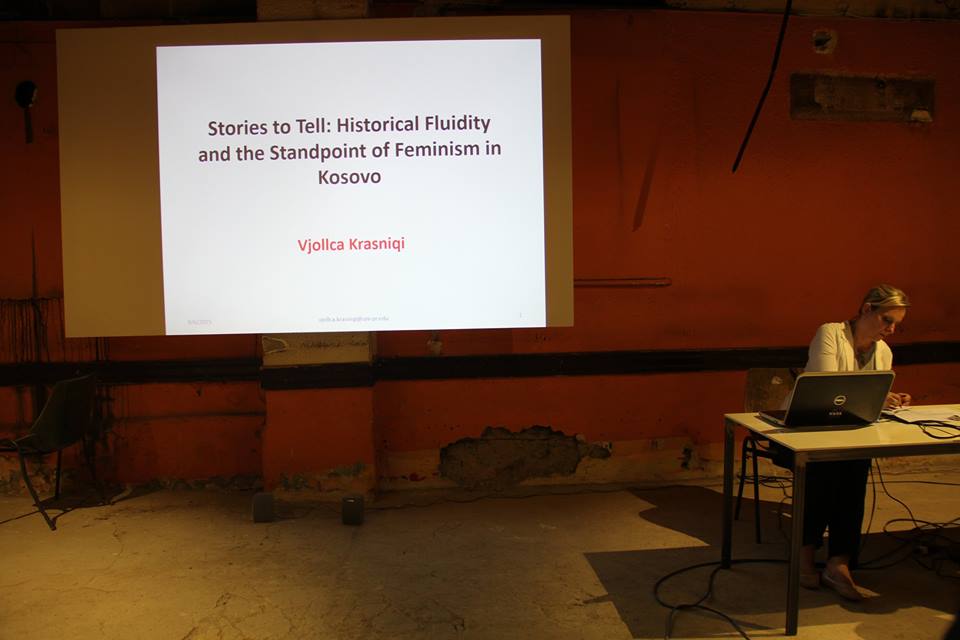
by Vjollca Krasniqi
Stories to Tell: Historical Fluidity and Standpoint Feminism in Kosovo
Feminist research is about the storytelling of collected events, narratives, and memories. It is also about the acknowledgment of the ways, in which they have shaped the history of the present time. To study feminism(s) across time does not necessarily bring attention to all feminist interventions one has witnessed, heard, and experienced. While engaging texts and practices embedded in the everyday politics of her generation, it is also about legacies and memories of the preceding ones. My lecture is, however, not an attempt to reconstruct a historiography of feminism and the women’s movement in Kosovo past and present. Instead, it is an intervention seeking to highlight the historical fluidity of temporal and spatial relations of feminism—as an idea, theory and politics—and to show the ways it has resonated across narratives and patterns of women’s mobilization in Kosovo in the last two decades.
Dr. Vjollca Krasniqi, sociologist. She holds a Ph.D. from the University of Ljubljana. She has an M.Sc. degree in Gender, Development, and Globalization from the London School of Economics and Political Science (LSE), and a BA degree in Philosophy and Sociology from the University of Prishtina. She is a lecturer in Sociology at the Faculty of Philosophy, University of Prishtina. Her research interests are: South Eastern Europe, gender, nation- building and state-building, peacekeeping/ peace building, development, ethnicity, collective memory, war, post-colonial theories, feminist theories, the body, sociology of everyday life, trans-nationalism and representation, ethnography. She has written on political, social, and gender developments in the Balkans. Her publications include: “Beyond the Incomplete: The Politics of Social Change in Kosovo” in Cvetičanin. P. (ed.) A Life of Tomorrow: Social Transformations in South East Europe (University of Skopje, Macedonia, February 2015); “Disability, Politics and Culture in Kosovo”, Socialno delo (Faculty of Social Work, University of Ljubljana, November 2014); “The Topography of the Construction of the Nation in Kosovo” in Pål Kostø (ed.) Strategies of Symbolic Nation-Building in South Eastern Europe, (London: Ashgate, March 2014); “Another Report on the Banality of Evil: The Cultural Politics of the Milošević Trial in Kosovo,” in Timothy Waters (ed.) The Milošević Trial: An Autopsy, (Oxford University Press, December 2013); Kombformimi Simbolik në Evropën Juglindore [Symbolic Nation-Building in South Eastern Europe] (ed.) (Prishtinë, QHPGJ, September 2013); “Feminism, Globalisation and Capitalism,” in Kasić, B., Petrović, J., Prelenda, S., Slapšak, S. (eds.) Feminist Critical Interventions: Thinking Heritage, Decolonising, Crossings (Red Athena University Press, Zagreb, September 2013); “Neo-Colonial Regimes, Sexual Politics, and State-Building in Kosova” in Free and Sovereign: Art, Theory and Politics. A Book of Essays and Interviews on Kosovo and Srbija, (Novi Sad, Censura, Kontekst Galerija, May 2013); “The Gender Politics of Post-War Reconstruction in Kosova,” in Christine Eifler and Ruth Seifert (eds.), Gender Dynamics in Post-Conflict Reconstruction (Bern, New York, Oxford: Lang Publishers, 2009); “Imagery, Gender, and Power: The Politics of Representation in Post-War Kosova,”Feminist Review, Vol.86 (July 2007); The Politics of Remembrance and Belonging: Kosovar Women since the War [co-authored] (Prishtina: CRGP, 2006). She has been a fellow of the Academic Fellowship, Open Society Institute during 2010-2015. She was a British Chevening Scholar in 2004-2005. She has been active in the women’s movement in the Balkans and organized and participated in a number of international conferences on political and gender issues.
Summer School as School is a project by Stacion – Center for Contemporary Art Prishtina, supported by: Ministry of Education, Science and Technology of the Republic of Kosovo, Culture for all – phase III, Kosova Foundation for Open Society, Friedrich Ebert Stiftung, Ministry of Culture of the Republic of Albania, Ministry of Foreign Affairs of the Republic of Kosovo, Ministry for European Integration of the Republic of Kosovo, Federal Chancellery of Austria, Austrian Federal Ministry for Europe, Integration and Foreign Affairs, Technomarket, Sindikata, X-print and DZG.